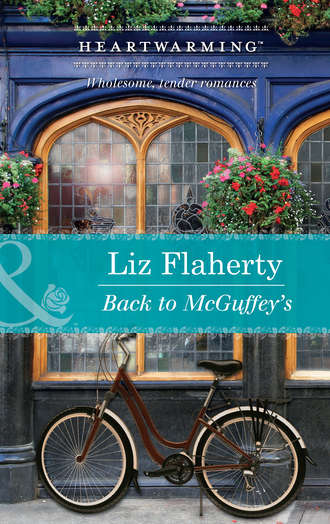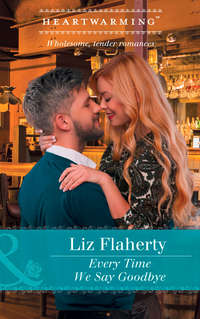
Полная версия
Back to McGuffey's
She started from the window seat to get the dish towel before she remembered that it had been lost in the fire. Grief, deeper and more scalding than she’d felt for her dishes and her quilts, made a shaking fist in her stomach. She hugged her knees and pressed her face against the soft cotton knit of her skirt.
A few minutes later, she was able to take a deep breath. A few deep breaths. And laugh a little at herself. She’d been so self-congratulatory that she’d felt scarcely any need to mourn over the possessions claimed by the fire, yet she was brought to her knees by the loss of one threadbare dish towel.
As though he could hear her thoughts, Ben looked up at the window where she sat. He waved, and she waved back. When he gestured—come on down—she didn’t hesitate, just slipped on the jeans and sweatshirt that had become her uniform and ran stocking footed down the back stairs of the B and B. She tiptoed past the closed door of Marce’s private quarters and stepped outside, stopping on the step to put on her shoes.
When he came to stand in front of her while she tied her shoelaces, she looked up. “I don’t know who I am anymore,” she blurted. “It was easy when I was the face and voice people knew at the law office and the woman who owned the duplex on Alcott Street.” She knew there were tears on her cheeks, and if she’d been talking to anyone besides Ben, she’d have been embarrassed by them. As it was, she just let them fall.
“I wouldn’t have thought my house and job and taste in household items made me into the person I was, but now that they’re gone, I don’t know who’s left. It used to tick me off so much that I was only Sarah Rafael’s little sister or one of the McGuffey boys’ girlfriends, but at least I was somebody. I wasn’t invisible even to myself.” She drew in a sobbing breath. “I’m not even somebody’s mom.”
Dirty Sally climbed into her lap and stood with her front paws on Kate’s chest to lick the salt from her face.
“She still knows who you are,” said Ben. He knelt, his gaze meeting hers in the dusky blue light from the moon and the solar lights beside the porch steps. “We’re back in the same place as we were thirteen years ago, aren’t we, Kate? We’ve both lost who we were and we’re both worried about who we’re going to become.”
She laughed, though it caught in her throat and sounded more like a sob. She supposed that was better than hysteria. “You want to go down to the tavern and break up? It was really horrible the first time, and I don’t understand even now why you did it, but it worked. We stayed broken up.”
“No.” He smiled at her. “We just made up in the tavern the other day. Not that we were ever mad at each other—at least, I don’t think we were. But it’s time we created a new relationship. Call it something new and life changing, like friendship. What do you think?” His expression sobered. “Maybe then we can talk to each other at weddings and funerals without feeling guilty about it.”
She frowned at him. She hadn’t felt guilty. Well, except while he was married. She’d still yearned for him, and coveting someone else’s husband wasn’t something she’d liked about herself. Later, when Ben’s younger brother Dylan told her the marriage was annulled, she hadn’t felt guilty anymore. Only sometimes, when the little flare of hope whooshed up under her breastbone and took her breath away. But she’d buried that quickly, stuffing it into a mental drawer that would have been labeled Denial if she’d been willing to give it that much thought.
Kate loved her friends. She and Penny knew things about each other no one else knew, even Joann and Kate’s sister, Sarah. But the link between Ben and herself had never come completely undone. Over the years since their breakup, she’d occasionally hated him, but she’d never stopped missing him. She’d never stopping wishing he was there to talk to. But he wasn’t her friend, was he? It was a whole lot more complicated than that.
Lucy, the inn’s resident golden retriever, slunk into the backyard from the alley behind and ambled toward the pet door. She raised a paw to push herself inside, then looked back over her shoulder at Kate and Ben. The struggle was written on the dog’s face: should she go inside and sprawl bonelessly on her bed or should she remain out here where it was cold and make sure she didn’t miss anything?
With a sigh and clicking toenails, she lay on the rug on the porch. Sally left Kate’s lap with a leap, landing in the middle of the C curve of Lucy’s body and snuggling into the burnished fur. The dog opened her eyes, sighed again, and closed them.
“Well,” said Kate, smiling at the animals, “I guess there might be stranger friendships than ours.” She got to her feet. “Come on, friend. I need to walk off some of these pastries Marce is forcing me to eat.”
“Forcing you, huh?” He chuckled and led the way out of the yard. “And here I was going to offer to buy you a bagel and a coffee—the Bagel Stop’s the only place in town that’s open this late. Guess I won’t ask you now. I’d hate to lead you astray.”
“Oh.” Kate walked beside him, stretching her stride as he shortened his so that by the time they reached the corner, she was gasping for air and he was taking baby steps. “You know,” she said, “if you’re hungry, I could probably get something down. Just a small coffee, you know, and maybe half a muffin. I could save the other half for breakfast.”
“You bet,” he said. “Come on, short woman. Move it.”
When he took her hand, it was a casual, friendly gesture, but it made the hair on the back of her neck stand up. She shook her head. It was probably just the frayed collar of her sweatshirt. She was going to have to get some clothes; that was all there was to it.
The Bagel Stop was half-full of people. Kate, a natural-born morning person, looked around in disbelief. She’d never been here later than nine in the morning and assumed that’s when everyone else came, too. There couldn’t possibly be this many people in Fionnegan who stayed awake until midnight. “I thought it would be empty.”
“This is a college town,” Ben reminded her, “and it’s time for finals.” He waved at the young woman behind the counter. “That’s Debby, who works nights and always looks tired. There’s a story there, but I don’t know what it is.”
The pretty waitress’s smile did much to erase the weariness from her face. She made recommendations and didn’t roll her eyes when Kate changed her mind. Twice.
“It’s a lot of calories,” said Kate, when Ben did roll his eyes. “I can only walk around the block so many times before I fall asleep.”
“That one’s not worth it.” Debby pointed at Kate’s second choice. “It looks nice and a lot of people like it, but it will sit in the middle of your stomach and weigh seven pounds. That one weighs seven pounds too—” she pointed at the first choice “—but it’s so worth it. I’d even run around the block for it, but it would take more than once.”
Kate opted for the first one, then followed Ben across the room to slide into a booth across from him.
She was halfway through her chocolate-chip-and-cream-cheese muffin and Ben was on his second bagel when a commotion from a corner booth captured their attention. By the time she said, “I wonder what’s going on,” Ben was halfway across the room, shouldering his way into the middle of the crowd that had materialized around the booth.
“Call 911,” he barked over his shoulder. Then to the milling group of panicked students, he said, “What’s he on? I need to know now.”
Kate reached for her cell phone and dialed the emergency number, noting that several people hurried out the door of the Bagel Stop, sprinting toward the college campus a few blocks away without looking back.
“I don’t know,” she said when the dispatcher came on the line and asked her to describe the situation. “A student collapsed at the Bagel Stop is all I can tell you. There is a doctor here. Yes, I’ll stay on the line.”
“Walk!” She flinched at the shouted command.
Ben and one of the remaining students held a barely conscious young man on his feet. “Come on, boy, get moving,” Ben ordered, not even a hint of a bedside manner in his approach, “or I promise you’re not going to like what they do to you in the emergency room.”
“’S jus’ pills,” the boy insisted. “Jus’ a coupla pills.”
Ben gave him a shake, one that had his head bobbing. “Yeah, yeah, I know—a couple. Been there and done that. No, you can’t sit down.”
“Gotta study.”
“You probably should have thought of that just a wee bit earlier in the semester. Keep walking!”
“’S hard.” The boy gamboled along between his escorts, walking as though his knees were made of rubber.
Kate stood aside and watched the scene unfold, waiting with the phone for further instructions from either Ben or the dispatcher. By the time the ambulance arrived, there were virtually no students left in the place other than the tall young man who’d supported his friend from the other side when Ben forced him to walk.
The ambulance attendants asked calm questions as they loaded the still-mumbling patient onto the gurney. His friend watched them prepare him for transport, his expression difficult to read.
“It’s hard for him,” he explained quietly to Ben and Kate after the ambulance had left. “He doesn’t care about college at all, but his folks think that’s the only way for him to be successful. It’s not that he’s lazy or anything. He’s not even that bad of a student, but he wants to go a different direction than the one they’ve laid out.”
“It’s too bad.” Ben shook his hand. “Thanks for helping get him back on his feet. It probably won’t be the last time he’ll need a friend.” He felt around in the pocket of his hooded sweatshirt, coming out with a business card. “If I can help, call that number.” He grinned. “When I was in college, I majored in disappointing my father. We both survived.”
The young man left, walking alone toward campus. As they watched through the window, others joined him.
“You’re good at that,” said Kate, when Debby had brought them fresh coffee and the students were out of sight. “Good at doctoring and good at listening.”
“I know how the kid feels.”
She looked up, startled. “What do you mean? And when did you disappoint your father? He’s always been proud of all of you.”
He shrugged. “All I wanted to do was ski in the Olympics—you know that. I went to med school because it was so important to my folks that we all get good educations and overcome the fact that we grew up in a bar.” Ben shook his head, looking away from her. “Thing is, I didn’t want to overcome it. It was great growing up the way we did. I’m sorry they didn’t realize it.”
Although a part of Kate was shocked that Ben apparently wasn’t as devoted to the practice of medicine as she’d always assumed, there was another part that understood. She remembered arguments he’d had with Tim about skiing when there was good powder. “The books’ll be there when the snow isn’t good anymore. They can wait.”
“No, they can’t,” his father had insisted. “You’ll end up behind the bar like your mother and me.”
So Ben had studied and excelled both in medical school and in practice in Massachusetts. Tim and Maeve were justifiably proud of their middle son. It had never occurred to Kate that he wasn’t proud of himself, as well.
“Did you come back to Fionnegan to start a practice here,” she asked, holding his gaze with her own, “or to break the news to your folks that you weren’t going to be a doctor anymore?”
CHAPTER THREE
“I DON’T KNOW,” he said quietly, as they sat across from each other at the Bagel Stop. “I don’t know why I came back.”
Kate asked a legitimate question, one Ben wished he had a definitive answer to. He’d thought about it over and over in the two weeks since they’d gotten the news. He’d talked to his father about it only a few nights before.
“Sometimes I hate medicine,” he’d said, washing and rinsing glasses.
“Aye.” Tim slid the stemware onto its racks and cast a surveying glance around the room, crowded with patrons eating Maeve’s Thursday night special. He leaned against the back counter, something he’d have reprimanded one of his children for. The change in the senior McGuffey, the visible weakening, made Ben clamp his teeth down on his bottom lip to keep from protesting aloud.
His father, a full four inches shorter and forty pounds lighter than any of his sons, laughed, a deep infectious sound that had lost none of its charm with his diminishing health. “Sometimes I think if one more person gets belligerent about the taking of his car keys, I’ll throw up my hands and let him go off and kill himself. But the truth is, he’d probably kill someone else and I’d never get over it.” He shrugged. “It’s what I do, and most days I like it much more than I don’t.”
Ben liked being a doctor, too. As his father put it, most days. He liked being able to heal, laughing with young patients, sympathizing with old ones. He liked studying and learning new things on nearly a daily basis. But he didn’t like insurance companies and the endless threat of lawsuits and having his own space in the professional building parking lot.
He thought that in particular was stupid. When one of the women who worked in their office had reached the basketball-out-front stage of her pregnancy, he’d urged her to use his parking place. She’d given him an incredulous look and said, “What, you want me to gain another twenty pounds? Waddling across the lot is the only real exercise I’m getting these days.”
Her laughing remark had made Ben consider his own fitness—or lack thereof. He’d grown up skiing, playing basketball and hiking, and while there were plenty of places in Massachusetts he could do all that, he didn’t really want to anymore. So he did cardio a couple of times a week in the rehab unit at the hospital, working up a sweat and wondering why he wasn’t happy. Sometimes, after a couple of beers on the golf course with old friends, he came close, but that only worked on the links-style course in the shadow of Wish Mountain just outside Fionnegan.
But most of what he didn’t like was centered on a single epiphanous life event, the one that had brought him back to Fionnegan.
His father’s diagnosis.
Tim McGuffey had come to America from Ireland at the age of seventeen. He’d worked as a waiter for five years until the County Mayo girl he loved could join him, then stepped behind the bar and never stepped out again. He and Maeve had bought the pub at the bottom of Wish Mountain when Morgan was little more than a baby. They worked sixteen-hour days and taught their children to dance, how to pour the best pints in the Northeast Kingdom and that Sunday mornings were for church, not sleeping late.
They emphasized to their brood of little McGuffeys that the good life was to be gained by hard work, education and the love of an equal partner. Although everyone paid their parents back the money spent on their educations, Ben never forgot that Tim wore the same suit to Morgan’s commencement from grad school that he’d worn when Patrick graduated from eighth grade. “It’s my graduation, wedding and funeral suit,” he’d said when Ben protested. He’d brushed the too-wide lapels, his eyes twinkling the way they always did. “Any day now, it’s going to be back in style. And aren’t you the lucky boy whose father never gains an ounce? Comes from clean living and good liquor.”
Ben had laughed, as Tim intended, but he still hadn’t liked it.
But most of what he didn’t like this summer of his return to Fionnegan, whether it was temporary or permanent, was that his father was dying and there wasn’t a thing he could do about it. All the years of schooling, study and practice couldn’t stop the rapid downward spiral of Tim’s heart disease.
“Go home,” said his ex-wife gently ten days ago, still in the hospital from when she’d delivered her third child with the neurologist she’d married after Ben. He’d gone to see her, carrying the gift the office receptionist had picked up for him. “Go home. Spend more time with your folks—you never know how long you’ll have them. Find what you’re looking for while you’re there. You’re my favorite ex-husband and you’ve got all kinds of shadows in your eyes.” Nerissa had smiled at him, that sweet smile that had captivated him all those years ago. “Find Kate.”
Now he’d done that, all of it. And after all these years, he still wanted Kate Rafael every time he looked at her. If he was being honest with himself, he wanted her when he wasn’t looking at her, too. He liked the extra pounds she carried on her hips, the way her face had slimmed into a defined heart shape as she’d grown older. Although he couldn’t talk himself into being sorry she was single, he did regret that she didn’t have any children. She’d always wanted four. So had he, but never as much as she had.
Now here they were in their late thirties; many of their friends’ children were in high school. Dan and Penny’s eldest, Samantha, was in college already, her pretty brown eyes set on being a veterinarian. Ben didn’t know about Kate, but he’d pretty much lost the urge to procreate. He’d been amazed and somewhat horrified when Nerissa got pregnant for the third time at thirty-six, but she’d been ecstatic and so had her forty-year-old husband, so what did her childless ex know?
Ben had grown not only unsure of his goals, but selfish as well, and he didn’t want to turn his life over to someone who would always have to come first.
But now, as he and Kate finished their coffee, Ben didn’t mention the fire she’d asked about, the internal one. Tim’s story wasn’t his to tell. Not yet. Ben’s parents had insisted no one outside the family know the extent of Tim’s illness, and the McGuffeys had all agreed to keep the secret. With different degrees of sulkiness, but agreed nonetheless.
He’d sat at a table in a Boston bar with his partners and his pediatrician brother Patrick and talked about it until he was no longer sure of what he was saying. He and his priest brother Dylan had ridden bicycle trails and talked some more. Prayed. And prayed some more. Just the night before, all his siblings had waxed the hardwood floor in McGuffey’s after closing and discussed what to do. What to say. They’d laughed a lot and cried some and hugged each other hard when they said goodnight. That wasn’t something they did—except for their little sister Morgan, who hugged everybody all the time. She cried pretty easily, too, but she didn’t take it well when they brought it up.
“I’ll stay here,” Ben had said as they stood together at the back door of the bar, “as long as there’s reason for me to stay.”
And that’s what he would do. It didn’t matter whether he remained a doctor or gave ski lessons on Wish Mountain, he was there for the duration. But he couldn’t say that to Kate. Not yet.
She slid out of the booth and reached for his hand. “I need to get some sleep, Dr. McGuffey, and so do you.”
Outside, in the chilly, damp air that was springtime in Vermont, they walked toward the bed-and-breakfast. Habit meant Ben always had his cell phone, even though the signal in Fionnegan was iffy at the best of times and nonexistent at the worst. He called the emergency room to check on the condition of the student.
“He’s fine,” he told her when he’d hung up. “Maybe now his folks will listen. The nurse said they were flying in.”
“Your folks would listen, too, you know, if you think you’ve made the wrong choices somewhere along the line,” Kate suggested. “They always have.” She laughed, her eyes twinkling. “Your dad even listens with a brogue.”
“He does, doesn’t he? And I know they’d listen.” Maeve and Tim had taught their children everything they knew, and they’d listened the whole time they were teaching. Time hadn’t changed that any more than it had changed the Irish lilt of his father’s voice.
Dylan had hated the very idea of tending bar, so Maeve had taken him into the kitchen. He’d learned to cook, as Tim said, “with a bit of the same magic as his mother.” He’d worked his way through college as a chef in the same Irish restaurant in Burlington where Ben and Patrick, the oldest of the McGuffey boys, had stood behind the bar. They’d had, as Ben remembered it, a little cult following among the crowd. The restaurant owner hadn’t been happy to see them go, although he’d been pleased when their little sister, Morgan, came along while Dylan was still an undergrad. Morgan was a good bartender and her looks were a definite asset besides.
“What about you?” Ben said, embarrassed by how much of their time together had been spent talking about him. “You’ve had a few days to think about it. How’s the future looking to you?”
“Terrifying.”
He steered her around a half barrel that would be full of petunias when the danger of frost passed, or at least became less of a threat. Maybe July.
“You know what it is?” she said suddenly, looking up at him.
“No. What is it?”
“I’m one of those people that life has just happened to. I’ve never wanted anything badly enough to fight for it. I’ve waited till something came along and then I’d say, okay, I can do that. That hasn’t been bad, but it’s not enough anymore. I want to want something.”
That was, Ben realized, the same thing he wanted. No matter how much he liked medicine, no matter how good he was at it—a mentor in his residency days had once said he was gifted—he’d never loved it. He didn’t want to examine the thought that his father’s illness, by making him angry at the world of medicine, was offering him a way out of it.
But he’d be willing to bet Kate wasn’t talking about what she—or he—did for a living. Not at all.
“Passion,” he said.
For the space of a few heartbeats, their eyes met and he knew she was remembering passion shared. He knew because that’s what he was remembering, too.
“Yes,” said Kate, and he had no idea how much time had passed. “That’s right.”
* * *
IT WAS EASY to feel at home in the bed-and-breakfast. With the passage of a few more days, Kate had taken on enough of the housekeeping duties that she no longer felt like a guest.
“How do you feel about managing the inn?” Marce squinted at her watch and then looked at Kate. “Say until the last week of August. You can move down into my rooms. The girls and I can spend the summer at the camp on Lake Willoughby Frank’s family owns. You can decide if you want to be an innkeeper when you grow up and maybe I can regain some equilibrium.”
“What if I lose all your clientele and you come back to a hovel even Lucy and Dirty Sally wouldn’t stay in?” asked Kate, loading the dishwasher with breakfast dishes. “What if I break some of this china?”
Marce grinned. “So far, you’re describing the place the way it was when Frank and I bought it, up to and including the broken dishes. That’s another part of it, by the way. Lucy needs to stay here. She’s old and she gets upset when we even take her away for a weekend. She loves us, but she loves home more.”
The temporary position would give Kate time to make a decision about her future. Time to find passion. Time to stop saying, “Schuyler and Lund,” every time the phone rang. That had triggered quite a reaction when her old boss called her after the house fire to offer his sympathy and ask if there was anything he could do. The offer stopped short of giving her job back, though.
“If it gets overwhelming, T. J. from over at Traveler’s Rest will be able to help you. He was a godsend when Frank died. It was amazing how much I didn’t know and I’d been here the whole time.” Marce still smiled, but sadness lingered in her eyes.
Kate took a deep breath. “Let’s crunch a few numbers. See if we can afford each other for the summer.”
They crunched, using the calculator on Kate’s phone and the paper napkins lying on the island, and by the time the dishwasher had stopped swooshing hot water around, they’d come to an agreement.
“I can pick the girls up at college in Burlington and we can go directly to the lake,” said Marce happily. “Going on the hope we could do business, I’ve already cleared you out a closet and a dresser in my room and made space in the bathroom for your things.” She looked pityingly at Kate’s sweatshirt. “You’ll get some soon.”






